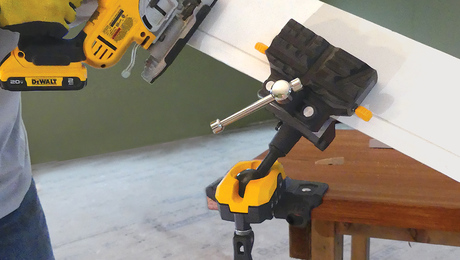I have inherited a huge bunch of tools from my father in law, but most have been in the family on various boats, and although sealed in tupperware, marine air and non stainless tools do not mix too well, it looks like there is a lot of surface rust. I am wondering what the best route to taking the rust off things like 1/2 sockets, box end wrenches and more…



















Replies
http://forums.taunton.com/n/mb/message.asp?webtag=tp-breaktime&msg=54049.1
Thanks for the link, I couldnt get the search to work tonite. well, i do have an aquarium, but I think its going to take a long long long time.... 80+ tools. do you know if boeshield takes the rust off?
Had the same problem with my kids leaving tools outside. Have a glass bead blaster (in a cabinet). Gets everything including some of the chrome. Coat everything with lube (some better than others). Mechanic friend was very meticulous with his hand tools. After getting them grungy on some clients Jeep he cleaned them in a solvent tank and wiped them dry with the ever present red rag. Pushed the corner of the rag through box end wrenches. He could eat off his shop floor. But as long as you already have rust just trade them in for something in stainless steel. Plenty of boat anchor makers out there. Just kidding. Tyr
Have you considered tumbling tools in media like shells or polishing rocks?
Jeff
Actually, yes! Just happen to reload and clean up the brass that way. Can't imagine what it would take to tumble a bunch of pipe wrenchs. A rubber drum bigger than my dryer and mucho media comes to mind. Although aluminum pipe wrenches are made and nice to use I have a hard time giving up my old ones. They get wet all the time of course. I bead blasted them, carefully and neatly brush painted everything but the jaws Safety Yellow (all my stuff is yellow--long before DeWalt). Then I used an automotive clear coat spray can on the jaws. Not perfect but pretty good. I usually blow any water droplets off with compressed air the first chance I get. Tyr
http://www.duluthtrading.com/items/92728.asp
"Rust Converter"
Haven't tried the stuff. Anyone familiar with it?
I've been using Chesterton's rust converter. It was $55/gallon about 30 years ago. I still have the last little bit of it, and it still works, so it doesn't have the 9 month shelf life that Duluth's stuff has. It's the best thing there is for a surface that will subsequently be painted. You do have to get rid of the loose rust by scraping and wire brushing first. Why waste the chemical on stuff that's only going to fall off anyway.
For tools that have to be bare metal in order to work (wrench jaws, chisels, etc) it will stop the progress of existing rust, but the blue/black oxide surface will wear off leaving bare metal, and you're back to square one. When I re-activated the Unisaw, I just scraped and scrubbed the rust off, then hit it lightly with emery cloth, and gave it a hard paste wax. That seems to have stopped the rust as well as the converter chemical.
-- J.S.
I once noticed that "Dekswood" (or however it's spelled) deck "freshener" takes the rust off of garden tools nicely. I thought it was the oxalic acid, but OA alone doesn't seem to do the same thing.
Best method I've found is to use citric acid (also known as sour salt) mixed with some warm water, just drop the tools in and let them sit. The rust will come off and you'll be right down to bare metal. Let them sit for a few hours or overnight and when derusted, get them out, rinse thoroughly, dry with an air nozzle or hair dryer and put a bit of light machine oil on them IMMEDIATELY or they will flash rust from humidity.
Ratio can be varies depending on how much rust there is and how fast you want it to work, but between 10-20 parts water to one part citric acid crystals by volume seems to work. You can also put a drop or two of dishwashing detergent and a drop or two of rubbing alcohol in to help, although I don't really know what the detergent or alcohol function is - I got the recipe elsewhere.
I put about 15 sockets in a plastic pretzel jug and about 4 pounds of sand, and the guts of two new diapers (to absorb moisture) and taped the lid on, tossed it into the back of my truck and drove 30 miles (local errands) they are starting to look better already!
I've used Naval Jelly before and it's worked out ok. Just follow the directions. I always rinse any bare metal parts in as hot of water as I can get. It heats the metal enough to make any residual moisture evaporate almost instantly. If I'm going to leave the metal bare for any reason (chisels....etc) I apply carwax. It's formulated to "stick" to mtal and seems to work well for me. As a plus, the white residue it leaves in the size etchings of the tools makes them easier to read. Good Luck